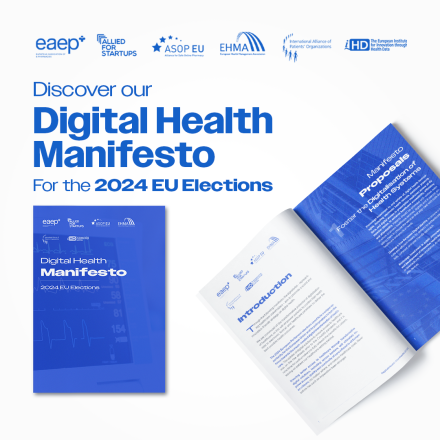This website uses cookies so that we can provide you with the best user experience possible. Cookie information is stored in your browser and performs functions such as recognising you when you return to our website and helping our team to understand which sections of the website you find most interesting and useful.
Patterns to tackle AMR: Designing Effective HAI Prevention and Control Programmes in Europe” by ENSH – European Network for Safer Healthcare
19 February 2019

A roundtable took place on 29th of January 2019 in the European Parliament. Fifteen relevant health stakeholders participated in a dynamic debate to assess levels of safety in health settings. The aim was to let them engage with policymakers and to more specifically consider key proposals to strengthen infection prevention and control practices across Europe to build safer healthcare for all. EHMA was represented by Secretariat staff and EHMA Member Prof. Dr. Dr. Wilfried Von Eiff, Centrum für Krankenhaus-Management (CKM), who joined the event as panelist.
Despite the political priorities of HCAIs, HCAIs in hospitals alone cause more deaths in Europe than any other infectious disease under surveillance at ECDC. A total of 8,8 million HealthCare Associated Infections (HCAIs) were estimated to occur each year in European hospitals and long-term care facilities combined. For example, on any given day 1/15 hospital patients have at least one HCAI which means that 98000 patients have at least 1 HCAI. This results in prolonged hospital stays, long-term disability and massive additional costs for health systems as well as for patients and their family. However, more than half of certain HCAIs are considered preventable.
In order to reduce HCAIs rates, the main key points raised by the health stakeholders that need to be addressed by policymakers are: 1. Focus on stakeholder engagement across Europe 2. Boost research, development and innovation 3. Shape a global agenda.
Focus on stakeholder engagement across Europe
“Share the ownership of the problem as well as ownership of the solution”. Most of the speakers agreed that everybody needs to work together and learn from each other in order to create the solution: politicians, patients, civil society, veterinarians, caregivers, pharmacists. A bottom-up approach should be followed. This means that policy makers should focus on the experience of nurses and patients. Moreover, cultural differences between regions and countries should be taken into account in improving patient safety.
Boost research, development and innovation
“If you cannot measure it, you cannot improve it”. The speakers pointed out the importance of data. Guidelines and recommendations should be based on evidence. The right data should be collected and used in an appropriate way. For example, it was shown that different measures were used to measure the same problem. This results in a heterogeneous set of data. Ideally, data measures should be uniformed across Europe. Finally, data on HCAIs should go back to the clinicians and nurses. This is not happening nowadays. Such feedback will allow to raise awareness which can then lead to improvement of practices in the future.
Shape a global agenda
“Do the right thing, at the right time”. According to the WHO, 3 steps are needed to reduce HCAIs. First, we need to understand the problem. Second, we need to base the recommendations on evidence. Lastly, these recommendations should be properly implemented. Europe should become the reference in best practices for HCAIs. This can be achieved by creating guidelines and preventive measures. A focus should be put on the patient journey instead of on their hospital stay. Guidelines should be adapted to the culture of the country, region and hospital. Training should be harmonised over EU countries. However, a reduction of HCAIs cannot be achieved by only creating guidelines. Such guidelines need to be implemented and translated into action. The WHO suggests that a multimodal strategy together with a multidisciplinary team is the best way to develop action plans. We need an action plan for each EU country/region, and this should be advertised and promoted.
Know more about the event with the Organiser’s dedicated summary and check out EHMA Member and event’s panelist Professor Dr. Dr. Wilfred Von Eiff views.
Recent News

ENVI Committee voting on the EU Pharmaceutical Strategy

Appointment of new Interim Executive Director

Our Digital Health Manifesto for the European elections 2024
What our Members say
I have been active in EHMA since the first years of the '90s and I have seen its evolution from a small association of members interested in sharing knowledge on health management practices to the current status of reference and advisory key player for EU, health systems and organisations, stakeholders associations, industry and universities. EHMA is now a unique knowledge hub, policy advisor, community of practice and network of best in class organisations involved in health policy and management. A place where health managers can build their competences, policy-makers and stakeholder associations envision how to implement and sustain change through health management, industry leaders understand how to engage more effectively with health organisations and systems. The right place to nurture and grow health management capabilities and capacity for every stakeholder of health systems.
Prof. Federico Lega, University of Milan, Italy
Health management has a crucial function in shaping public health and health system challenges. The Medical University of Varna, Bulgaria had success in collaborating with EHMA on EU-funded projects that has resourced us to create new health management competencies for the future workforce. In addition to all classical definitions, health management is a science dealing with individuals, groups, and society at large. It is an art contributing to the beauty of our lives and an interactive communication process at all levels of institutions and human energy. I have also had the pleasure to chair the South Eastern European Special Interest Group which gives members a space to discuss and tools to address how health systems are managed in our regions.
Prof. Todorka Kostadinova, Medical University of Varna, Bulgaria
I enjoy the high level of interaction and engagement in EHMA’s activities, in particular during the annual conference where the panel discussions are rich and well prepared. As a hospital manager and professor of health management, EHMA motivates and inspires me to be creative. You go back home feeling energised from seeing old friends and making new connections, as well as being convinced of serving as EHMA’s ambassador. It’s a strong feeling of interdisciplinary engagement, but it also feels like being part of family-like community.
Prof. Sandra C. Buttigieg, University of Malta, Malta
EHMA is a pre-eminent organisation for everyone working in planning, managing and delivering health services across Europe. As a long standing member of EHMA I have always been impressed by the vibrant community of managers, researchers and academics it has created and by the many opportunities for sharing knowledge and funding opportunities it has brought to its members. Its international scope is impressive and its impact is often felt in management and research across European and national health systems.
Prof. Axel Kaehne, Edge Hill University, UK
Health workforce has become more essential in operating, managing and maintaining health systems lately, particularly in crisis and emergency situations. European healthcare professions and the workforce need to be high on the agenda of managers and decision makers. The Health Services Management Training Centre, Semmelweis University in Hungary is a longstanding EHMA member, because it connects us with collaborators and experts, with whom we can have complex debates, from whom we can learn and at the end find solutions in various challenging fields of healthcare management.
Dr Eszter Kovács, Health Services Management Training Centre, Semmelweis University, Hungary
As a hospital administrator and health management professor, I see on a daily basis that the healthcare challenges require talented and skilled managers to transform it. the EHMA membership has been beneficial to bring healthcare management research and education to the demanding healthcare services world, promoting healthcare management competencies and knowledge creation.
Dr Alexandre Lourenco, APAH - Association of Portuguese Hospital Managers, Portugal
Many healthcare systems in Europe and beyond are facing similar challenges which require innovative and creative solutions. EHMA’s annual conference, webinars, Programme Directors’ group and other activities and resources provide incredible opportunities for networking, connecting and sharing experiences. A distinct feature of EHMA is the diversity of members with representation from many countries, sectors and different communities of practice – academic, policy-makers, practitioners, managers, leaders and students. The annual conference is a highlight in the calendar year, offering a friendly, fun and learningful environment for emerging and established members to engage, collaborate and meet up with old and new friends. I am proud to be a member of the EHMA Board.
Prof. Ann Mahon, University of Manchester, UK
Society evolution, pandemics and ageing modify health needs. So, health policies and services are to change dramatically. EHMA, through webinars, workshops and annual conference provides an excellent insight to a professional changing world, favouring closeness to management innovation and the protagonists of these changes. As a primary care services’ manager, participating in EHMA activities is really worth it and allows to involve oneself in the innovation processes.
Dr Antoni Peris Grao, Consorci Castelldefels Agents de Salut (CASAP), Spain